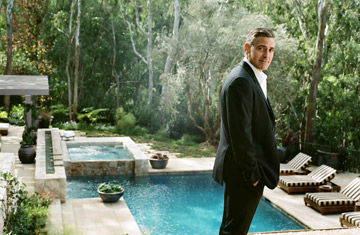
"It would be nice if prodigiously gifted, handsome, multimillionaire George Clooney were in fact a bastard," says Michael Clayton co-star Tom Wilkinson. "He isn't."
(3 of 3)
One of the things O'Reilly has taken issue with is Clooney's involvement in the crisis in Darfur, saying it's reverse racism from someone who didn't care about the Arabs being killed by Saddam Hussein. Clooney got interested in Darfur in 2005 after the campaign for Oscar votes for Syriana and Good Night, and Good Luck made him feel dirty. "You're campaigning for yourself. To compete for art," he says. His dad was also dejected and angry after losing an election for Congress, and Clooney had been reading about the lack of attention being given to Darfur, so the two went on a trip to Africa to shoot footage. Clooney wasn't able to get into Darfur until late January, when the U.N. said it would give him an official title. "I have a U.N. passport. It says 'Messenger of Peace' on it. It's very cool," he says.The Darfur organization he helped found, Not on Our Watch, has given away more than $9 million. But now, just three weeks back from having a 14-year-old border guard shove a machine gun at his chest, after recovering from malaria, after helicoptering out of N'Djamena, Chad, in a sandstorm three days before the rebels sacked it, he wonders if his critics are right, if this scheme to use celebrity to bring attention to the world's plights isn't, if not vanity, at least striving after wind. "I've been very depressed since I got back. I'm terrified that it isn't in any way helping. That bringing attention can cause more damage. You dig a well or build a health-care facility and they're a target for somebody," he says. "A lot more people know about Darfur, but absolutely nothing is different. Absolutely nothing."
He feels his advocacy is not even accomplishing as much as his family did during the embarrassing Christmas day trips his dad would arrange every year, when they would show up with gifts for a family who wrote to his dad's TV station, asking for help. Now he wonders if it is better to give money and get out of the way, as he does when he gets off Highway 101 at Laurel Canyon Blvd., where there's always a person begging for money. "You think, This is a $20 light. So you hope to catch the light. And then you feel guilty for hoping to catch the light," he says. "People say, They'll buy booze. Fair enough. They need it." Clooney, having helped knocked off two bottles of red and two bottles of dessert wine--all after drinking heavily in Vegas the night before--is not one to deny someone else alcohol.
It's past midnight; we're both pretty buzzed. He's telling me how he wakes up every morning at 5:30 to the hoots of a giant owl and how he climbs into his hot tub so he can hoot back, mesmerized by nature, like Tony Soprano and his ducks, when this alarm starts shrieking. Clooney, not a man of inaction, especially in a moment of crisis like this, stands on my dining-room table, unscrews a panel in the ceiling and, finding nothing, makes me go outside and carry a huge ladder with him up two flights to my garage upstairs--where he climbs into an area I've never dared go, crawling along the beams with a screwdriver between his teeth. Finding nothing, he climbs down, knocks the dirt off his jeans, blows the dust out of his nose, rinses his hands and returns to the table. The shriek starts again, and Clooney thinks for a few seconds, ducks down and yanks the carbon monoxide detector out of the outlet. "Either it needs a battery," he says, "or we have six seconds to live."
At 1:30 he gets up to leave. He tells me that the next time I have interviewees over for dinner, I should trick them by passing his house off as mine, maybe with some hired servants, smoking a pipe, pretending journalism is something I do as a lark, separate from my silver-mining interests.
As he leaves, I feel as if I failed. In seven hours, I wasn't able to find a part of Clooney different from the one everyone already knows. As he retreats in his movie-star car to his movie-star lair with his giant-owl sidekick, I feel pretty sure he never separates the public from the private. It explains, at least, why he sucked as Batman.
Then two nights later I get a chance to run the experiment again. My wife and I figure we'll check out the sushi place Clooney said he's been going to for 15 years. When we walk in, there's only one occupied table, and of course it's Clooney, his girlfriend, his assistant and a friend he met the first day he moved to Los Angeles. He's unprepared for me, out in the open, vulnerable. But he yanks over a table, puts it next to his, tells us what to order, hands us food from his plate, shows us photos of him and the other guy at the table with Keith Richards, reads the cheesy lines he's just been faxed for his Oscar presenting, fights for the check and generally hosts the crap out of us. Clooney is a movie star not because he's overwhelmingly electric or handsome or fascinating. After two very fun nights, I can tell you that he really isn't any of those things. George Clooney is a movie star because he's happiest when he controls how everyone around him feels. Because that's what movies do.
